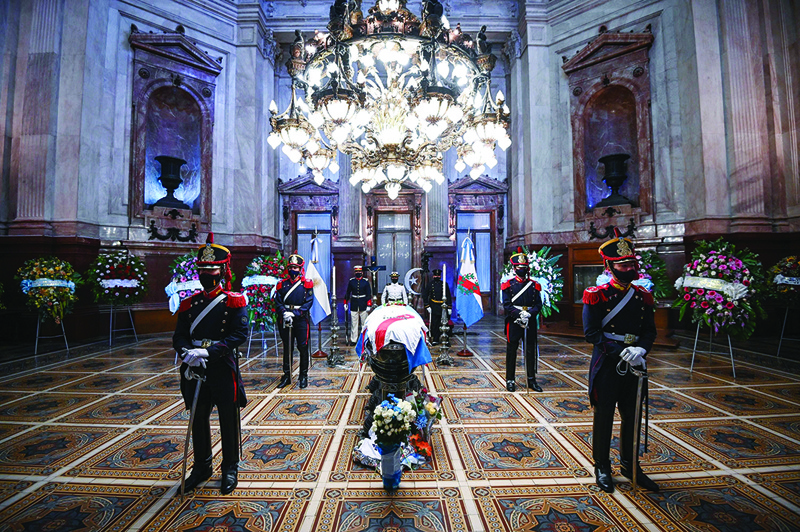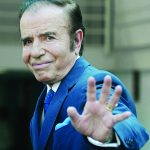 BUENOS AIRES: Handout picture shows the coffin with the remains of late former Argentine president Carlos Saul Menem lying in state at the funeral chapel at the Congress yesterday. - AFP
BUENOS AIRES: Handout picture shows the coffin with the remains of late former Argentine president Carlos Saul Menem lying in state at the funeral chapel at the Congress yesterday. - AFP
BUENOS AIRES: Argentina's former president Carlos Menem, who marked his country with a neoliberal approach to the economy, died in a Buenos Aires clinic on Sunday at the age of 90. Menem had been in poor health and was hospitalized several times in recent months for pneumonia. Incumbent President Alberto Fernandez, who declared three days of national mourning for Menem, tweeted his "deep regret" at the news of his passing and extended condolences to Menem's family.
Menem was to be buried yesterday in the Islamic cemetery in Buenos Aires next to his son, Carlos Menem, Jr, who died in 1995 in a helicopter accident. The former president's wake began Sunday night at the Congress building, where Vice President and Senate leader Cristina Kirchner received Menem's family and coffin, draped with the Argentine flag. An emotional Fernandez and his wife, Fabiola Yanez, arrived an hour later and offered their condolences to the family. After that, the doors were opened to admit the hundreds of mourners lined up outside.
Born in July 1930 into a family of Syrian immigrants, which earned him the nickname "The Turk", Menem prided himself on never having lost an election. He served two terms as president, from 1989 to 1999. After withdrawing from the race for a third term, he was elected to the Senate in 2005, and was re-elected several times since.
Menem identified as a follower of Peronism, the leftist movement based on the legacy of former president Juan Peron that today covers a broad spectrum of political leanings in Argentina. He pursued an aggressive privatization policy that many saw to be in direct contrast to his stated political ideology.
His name is synonymous with the "Argentine miracle", a period when his decision to fix the exchange rate of the peso to the US dollar brought economic stability and an end to hyperinflation. But this approach is widely considered to have led to the economic crisis of 2001, when debt stood at $100 billion, the country defaulted on repayment, the currency's value plunged and unemployment skyrocketed.
By the end of Menem's second term, the public deficit stood at $6 billion, unemployment was at 14 percent and poverty affected a third of the population. But things were to get worse. Menem cultivated a playboy image, drove a Ferrari, played golf and was a friend of the jet-set. Despised by the middle class for his flamboyance, the aficionado of luxury watches enjoyed both the admiration of the poor and the self-serving support of the wealthy.
He was widely criticized for extending a presidential amnesty to leaders of the military dictatorship of 1976-1983. His presidency was tarnished by multiple accusations of corruption and scandals. But while Menem was investigated in several cases, he never served jail time. In 2001 Menem was ordered held in pre-trial home detention for a case involving arms smuggling to Croatia and Ecuador, but he was freed weeks later under a Supreme Court ruling and ultimately let off.
Menem was also tried for covering up the 1994 attack on the Argentine Mutual Israeli Association (AMIA) in Buenos Aires, which killed 85 people, but again was acquitted. In 2018, he was sentenced to three years in prison for embezzlement, but his parliamentary immunity protected him from going to prison. Menem had three children from two marriages, the first with Zulema Yoma and the second with former Chilean Miss Universe Cecilia Bolocco. He fathered a fourth child, Carlos Nair, with a lover.
Menem's daughter, Zulemita, said the former president would be buried next to Carlos Menem Junior - who died in 1995 in a helicopter accident - in the Islamic Cemetery in Buenos Aires. Chile's President Sebastian Pinera paid tribute to Menem on Twitter as a "good friend of Chile". - AFP





